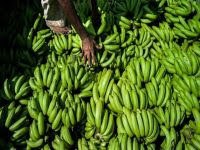Bananas have key role in food for the warming world
Study says that with rising temperatures, fruit can replace the potato as a staple food in some developing temperate countries... A newly released report says that climate change could make the banana a crucial food source for millions of people.
A newly released report says that climate change could make the banana a crucial food source for millions of people.
The finding is part of a report prepared by the Consultative Group of International Agricultural Research (CGIAR, its acronym in English), an entity that brings together researchers from around the world and aims to reduce rural poverty, increase food security and improve the health and human nutrition, making use of a generally sustainable resource.
According to the CGIAR, fruit can be substituted for potatoes in some developing countries.
At the request of the UN Committee on Food Security, experts analyzed the effects of climate change in 22 on the world's most important agricultural commodities.
They predict a decrease in the production of potato, rice and wheat - three agricultural products that offer greater sources of calories.
They claim that the cultivation of potato, which grows best in temperate climates, may suffer from rising temperatures and climate change.
The authors state in the report that these changes may offer an opportunity ''for growing certain varieties of bananas'' in areas of higher elevation, even in places where potatoes are currently grown.
Option
''It's not necessarily a magic formula, but there will be areas where, to the extent that the temperatures are rising, bananas may be an option for small farmers,'' said Philip Thornton, in an interview, one of the authors enrolled in the study.
The document states that wheat provides the most important source of calories and protein derived from a plant. But he added that cereal will face difficulties in the emerging world, where prices of cotton, cassava, wheat and soy, planted on poorer agricultural land, may cause the product to be more vulnerable to problems associated with climate change.
A possible replacement, especially in South Asia, could be cassava, which is more resistant to the most intense climates.
But how easy is it to get consumers to adapt to new foods and new diets?
Bruce Campbell, the director of the Climate Change Agriculture and Food Security Program, (CCAFS, its acronym in English) said that the changes that are occurring now also took place in the past.
''Two decades ago, there were hardly any consumption of rice in parts of Africa, as there is now. People's habits have changed due to the price. It is easier to acquire, and rice is easier to cook. I believe that changes happen and they usually happen in the future,'' he said.
A major concern for researchers is how to obtain sources of proteins that make up the diet. Soybean is a major source of protein, but it is susceptible to climate change.
Scientists say cowpea, known in sub-Saharan Africa as a ''poor'' meat, is resistant to drought and is best suited to warm climates and therefore could be a good alternative to soy. Bean leaves can also be used as livestock feed.
In some countries, such as Nigeria and Niger, farmers are already moving away from cotton production to growing cowpeas.
According to the study, it is also likely for there to be developments in animal protein sources says the report, including in the next few years a shift to smaller livestock.
''This is an example of something that is already happening. There was a big transition from raising cattle to raising goats in South Africa, something that occurred as a result of drought. When farmers realize that there are problems in their production, they really have to change. This change is really possible, not just a crazy idea,'' said Campbell.
Translated from the Portuguese version by:
Lisa Karpova
Pravda.Ru

Subscribe to Pravda.Ru Telegram channel, Facebook, RSS!


